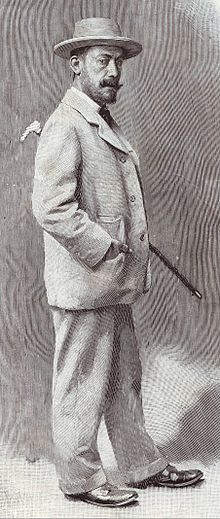Cesare Pascarella

Cesare Pascarella (28 April 1858 - 8 May 1940), was an Italian dialect poet and a painter. He was appointed to the Royal Academy of Italy in 1930.
Pascarella was born in Rome and initially was a painter. His literary activity began in 1881 with the publication of sonnets in Romanesco dialect. In the same period he made friends with Gabriele D'Annunzio. He made a series of journeys through Africa, India and the Americas in 1882–1885. On his return to Rome he published the collection Villa Glori, who was hailed as a masterwork by Giosuè Carducci. Also well received was the imaginative La scoperta dell'America (1893).
In 1905 Pascarella began Storia nostra, a history of Rome which was planned as a sequence of 350 sonnets, but was left unfinished after 270 had been written.
He founded in 1904 with other artists, among which Giuseppe Ferrari, the group "XXV della campagna romana".[1]
Pascarella's papers, his library, photographs, paintings and drawings were purchased by the Royal Academy of Italy (now Accademia Nazionale dei Lincei) in 1940. The body is entirely ordered.[2]
Works
- Er morto de campagna (1881, sonnets)
- La serenata (1883, sonnets)
- Er fattaccio (1884, sonnets)
- Villa Glori (1886, sonnets)
- Cose der monno (1887)
- L'allustra scarpe (1887, philosophy)
- La scoperta dell'America (1893, sonnets)
- I sonetti (1900, sonnets)
- Le prose (1920, prose works)
- Viaggio in Ciociaria (1920)
Posthumous publications:
- Italia nostra
- Taccuini (published in 1961 by the Accademia dei Lincei)
- Storia nostra (published in 1961 by the Accademia dei Lincei)
See also
References
- ^ M. C. Cola, Giuseppe Ferrari, in Dizionario biografico degli italiani Treccani, volume 46, 1996.
- ^ D. Armocida, Il Fondo di Cesare Pascarella: storia e documenti, Roma, Scienze e lettere editore, 2011, pp. 323-348 (from: «Atti della Accademia Nazionale dei Lincei. Classe di Scienze Morali, Storiche e Filologiche. Rendiconti», Serie IX, Vol. XXI, Fasc. 1-2, 2010).
- Rendina, Claudio (2000). Enciclopedia di roma. Rome: Newton & Compton.
